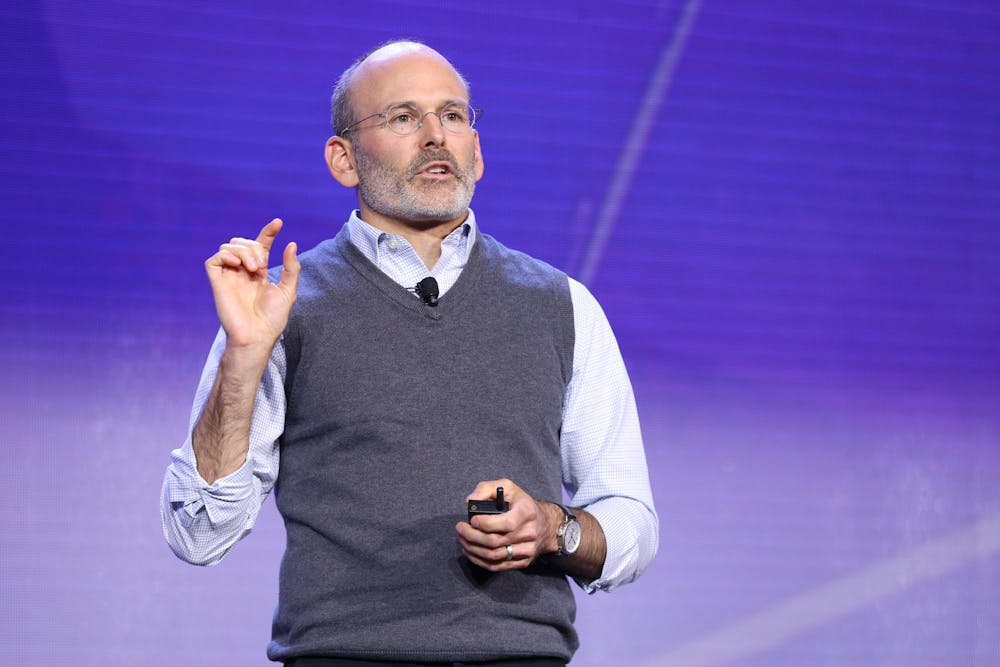On Sept. 20, Dr. Jud Brewer ’96 visited campus to give a talk regarding anxiety and strategies for coping with it. Brewer discussed how to reframe the conversation around anxiety, focusing on thinking critically about why people have anxious feelings rather than cutting out potential triggers for anxiety.
The talk, held in the Louis A. Simpson International Building, focused on Brewer's book “Unwinding Anxiety,” a book that explores the ways in which mindfulness practices and techniques can quell ongoing sequences of anxiety. The talk was hosted by Eleanor Clemans-Cope ’26 at an event sponsored by The Daily Princetonian, “The Daily Princetonian in Conversation.”
Clemans-Cope is the head Opinion editor at the ‘Prince.’
Brewer, a psychiatrist, neuroscientist, and the Director of Research and Innovation at the Mindfulness Center at Brown University, opened the talk with an account of anxiety that he has faced in his own life, explaining that his anxiety translated into physical symptoms that included a case of irritable bowel syndrome (IBS). According to Brewer, his anxiety and related IBS disrupted his routines as a student while on campus.
“I had no idea that I was that anxious, and it was really important,” Brewer said. “Anxiety can be this shape shifter. It was something that I didn't even know that I had. I think that's important for us to know, because it can show up in different ways for different people.”
Brewer believes that avoiding triggers alone isn’t the solution, representing a fresh perspective on student mental health.
“They think if I could just avoid these cues of triggers, then this would work. We’re lulled into that fallacy, because when we avoid cues, we’re less likely to do whatever the behavior is,” Brewer said. “If a behavior is very rewarding, we're going to keep doing it. If it’s not rewarding, that's where we become disenchanted with it and we stop doing it,” he added.
According to Brewer, other signs of anxiety include a tight chest, the feeling that a person’s head is spinning, and heart palpitations. Brewer separates these feelings from behavioral patterns.

“Feelings come up, they show up, just like thoughts show up. But behaviors are things that we learn and we can unlearn, and that was a critical a-ha moment for me when I was struggling to help my patients with anxiety and failing miserably,” Brewer said.
Brewer elaborated on topics in his book, such as the connection between anxiety and uncertainty — especially relevant to students facing mounting workloads. In some ways, according to Brewer, anxiety can almost be seen as a “badge of honor” that becomes transmitted between grades and develops into a pervasive culture on campus.
“As friends, we want to validate each other’s experiences … but our anxious brain can say … that means it's good to be anxious. It can feed that cycle of anxiety where we wallow in it a bit more, let’s say more than we need to, because … there’s really no useful benefit to anxiety itself,” Brewer said.
Brewer’s talk is situated within a larger conversation about mental health, anxiety, and their intersection with academic rigor on college campuses, including Princeton. Some have advocated for a kinder campus, while others have said that students simply can’t do it all.

“Let’s stop expecting students to carry on this double life of being a student, an athlete, an activist, a president, and someone who has to take care of themselves,” Noah Luch ’24, at the time the chair of the Undergraduate Student Government (USG) Mental Health Committee, wrote in a guest contribution in the ‘Prince’ in April 2023.
To break out of the “badge of honor” mindset surrounding anxiety, especially in rigorous environments like Princeton, Brewer underscored the importance of having the curiosity to explore oneself and the nature of anxious feelings.
“Curiosity becomes a superpower because we can start to lean into the feeling of anxiety instead of running away from it,” Brewer said. In contrast, “one of the simple ways to look for anxiety is a feeling of contraction or [feeling] closed down.”
“Curiosity will conquer fear even more than bravery will,” he added.
Isabella Dail is a staff News writer and head editor for The Prospect for the ‘Prince.’
Please send any corrections to corrections[at]dailyprincetonian.com.








